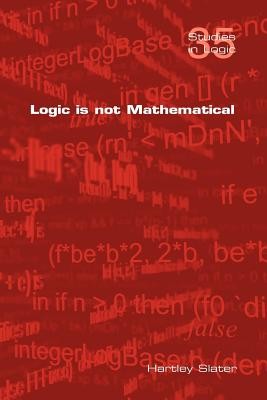
- We will send in 10–14 business days.
- Author: Hartley Slater
- Publisher: College Publications
- Year: 2011
- Pages: 148
- ISBN-10: 1848900511
- ISBN-13: 9781848900516
- Format: 15.6 x 23.4 x 0.8 cm, minkšti viršeliai
- Language: English
- SAVE -10% with code: EXTRA
Reviews
Description
'Logic is not Mathematical' is a collection of the author's recently published papers. It traces a series of egregious errors that the founders of modern logic made, which have been uncorrected to this day largely because of the mathematical and empirical orientation of most of the main protagonists. Whether a piece of language is coherent or incoherent is independent of whether it has factual or fictional content, for one thing, but Logic is a literary subject, the author argues, in more ways than that. For this conclusion is defended in fine detail in a large number of areas by itemizing how the use of natural language features removes major difficulties that have beset the Fregean tradition, including Russell's Paradox, Berry's Paradox, and the Liar Paradox. Overlooking pragmatic features like the necessary contextuality of language is what has primarily given rise to these problems. But a whole range of other, patently wrong, linguistic confusions have been involved as well, such as confusing use with mention, reference with description, identity with equivalence, predicates with mathematical functions, predicates with their nominalizations, predicates with forms of sentences, and mentioned sentences with 'that'-clauses. The continued prevalence of these errors in what is now a very professional discipline is hard to comprehend, but it displays a major failure in the mental outlook of the mainline logicians who have followed on from, and developed Frege's advances without a second thought.
EXTRA 10 % discount with code: EXTRA
The promotion ends in 22d.23:43:39
The discount code is valid when purchasing from 10 €. Discounts do not stack.
- Author: Hartley Slater
- Publisher: College Publications
- Year: 2011
- Pages: 148
- ISBN-10: 1848900511
- ISBN-13: 9781848900516
- Format: 15.6 x 23.4 x 0.8 cm, minkšti viršeliai
- Language: English English
'Logic is not Mathematical' is a collection of the author's recently published papers. It traces a series of egregious errors that the founders of modern logic made, which have been uncorrected to this day largely because of the mathematical and empirical orientation of most of the main protagonists. Whether a piece of language is coherent or incoherent is independent of whether it has factual or fictional content, for one thing, but Logic is a literary subject, the author argues, in more ways than that. For this conclusion is defended in fine detail in a large number of areas by itemizing how the use of natural language features removes major difficulties that have beset the Fregean tradition, including Russell's Paradox, Berry's Paradox, and the Liar Paradox. Overlooking pragmatic features like the necessary contextuality of language is what has primarily given rise to these problems. But a whole range of other, patently wrong, linguistic confusions have been involved as well, such as confusing use with mention, reference with description, identity with equivalence, predicates with mathematical functions, predicates with their nominalizations, predicates with forms of sentences, and mentioned sentences with 'that'-clauses. The continued prevalence of these errors in what is now a very professional discipline is hard to comprehend, but it displays a major failure in the mental outlook of the mainline logicians who have followed on from, and developed Frege's advances without a second thought.


Reviews